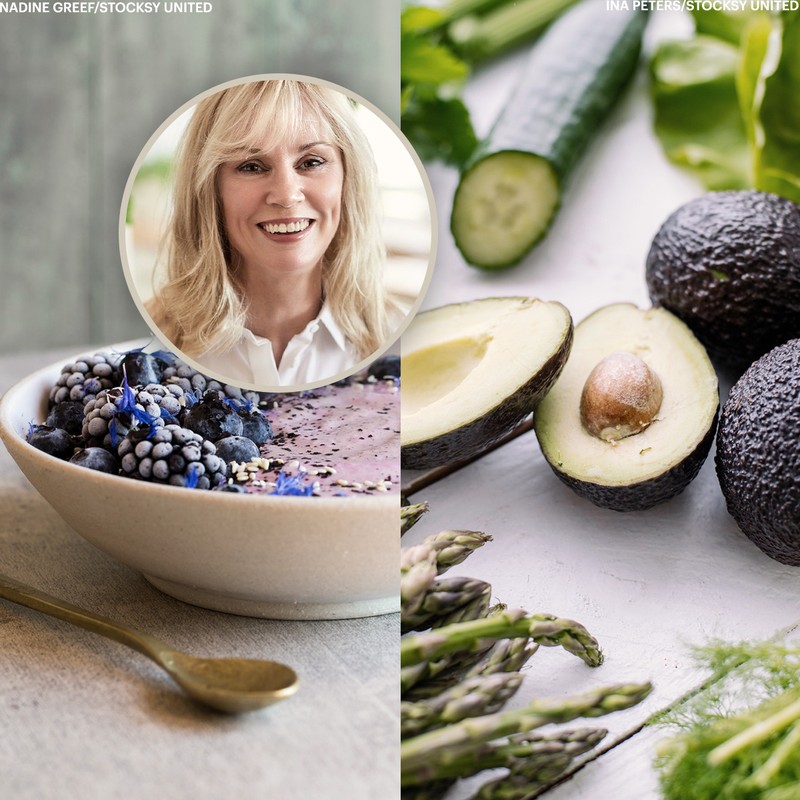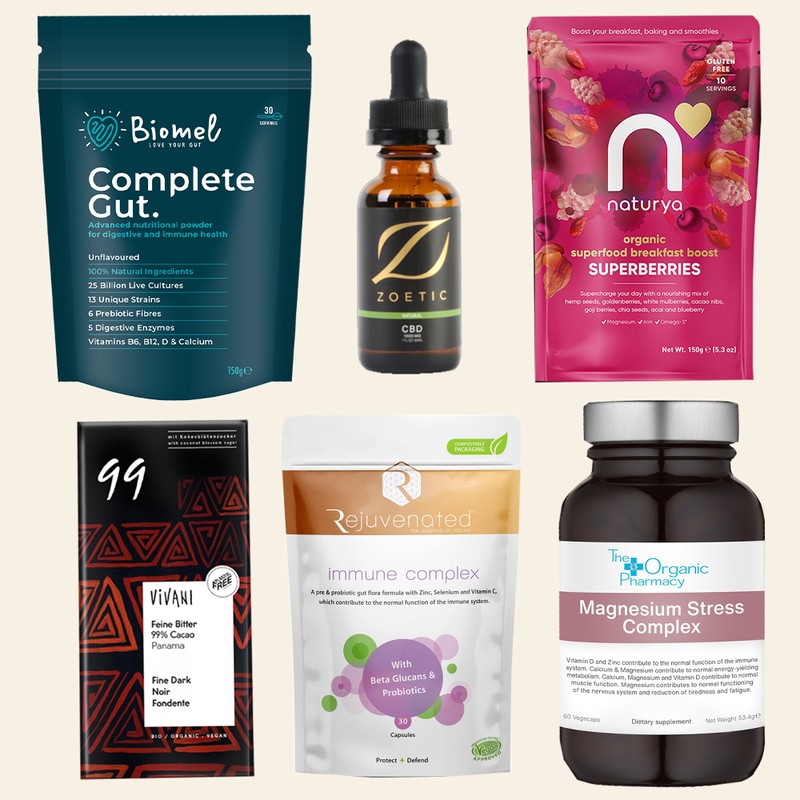
How I Stay Well & Healthy With Kathryn Danzey
The last year has shown us that looking after the immune system is vital. It’s believed around 70% of your immune system lives in your gut, so making sure your digestive system is in tip-top shape is a good place to start when it comes to boosting immunity. Taking both pre- and probiotics can help nourish the gut. There are trillions of bacteria that live in the lining of the digestive tract – these are known as probiotics. They are the good bacteria that promote healthy digestion and give the immune system a boost. Although your digestive tract naturally produces probiotics, it’s beneficial to also consume more foods rich in probiotics to increase your levels and variety of strains. Prebiotics, on the other hand, are the indigestible components of food that reach the large intestine (where most of your gut bacteria resides) to feed the good bacteria. Eat more probiotic and prebiotic-rich foods – kefir, sauerkraut, plain live organic yoghurt and kombucha are rich in probiotics, while the likes of garlic, onion, leeks, asparagus, apples and artichokes are packed with prebiotics.
The right supplements can support the ageing process. While the likes of vitamins C and D get a lot of airtime in the supplement world, NAD+ supplements deserve attention, too, especially if you’re looking for an anti-ageing solution. In a nutshell, NAD+ is a compound that certain enzymes in your body need in order to do their work, but levels diminish as you age. Studies show supplementing with NAD+ boosts cellular energy, supports muscle function, repairs DNA, improves insulin sensitivity and boosts cognitive and cardiovascular functions. Research also suggests that regularly taking NAD+ may also help with menopausal symptoms. I recently launched an NAD+ supplement – it combines NAD+ with plant-based molecules to kickstart sluggish energy levels. I couldn’t be without it.
CBD can help with stress. I’m fascinated with CBD, as there are so many health benefits associated with it. But, of course, these vary from one individual to the next so it’s important to do your research. I find it particularly effective at reducing stress levels – I take Zoetic’s CBD oil, which has a refreshing orange taste – but I’ve also heard incredible stories of benefits for Parkinson’s and pain relief.
Don’t underestimate the importance of sleep. We all know we feel more rested after a good night’s sleep, but the quality of your sleep impacts countless facets of your health, from gut health to mood and brain function. To improve your sleep quality, consider supplementing with magnesium, which can help your brain and body relax. On a chemical level, magnesium activates the parasympathetic nervous system, which is responsible for calming you down. I try to stay away from computers and other electrical devices in the evening, and try to stick to an evening routine as much as possible. Having a bath before bed also works wonders – a warm bath raises your body’s core temperature and forces it to cool once you are out, and it’s this drop in temperature that signals to the body it’s time for sleep.
I went through the menopause at an early age. I was only in my early 40s when I went through the menopause and, for years, I counteracted symptoms by following a healthy diet and taking hormone support supplements. In my 60s, I now optimise my hormones with bio-identical hormone replacement therapy and use oestrogen and testosterone gels as well as progesterone in capsule form.
Following a low-FODMAP diet can help with digestive issues. As I approached my 50s, I started to suffer with IBS. My mother died from bowel cancer, so I booked to see a specialist as soon as I started noticing symptoms. He recommended a low-FODMAP diet, which has transformed my gut issues. Though gluten-free diets have been hailed as a miracle cure for easing bloating, a diet that is low in FODMAPS could be worth looking into. FODMAP is an acronym, which stands for fermentable, oligosaccharides, disaccharides, monosaccharides and polyols, a group of simple and complex carbohydrates found in a variety of foods spanning everything from onions and garlic to lentils and rye. Unlike other carbohydrates, FODMAPs aren’t completely absorbed in the small intestine and, instead, end up in the large intestine where they can rapidly ferment and cause diarrhoea and gas. The low-FODMAP diet has been found to be effective for around 70% of people with IBS, but it’s important to understand it’s not a long-term diet and you should always seek professional advice before starting.

Eating more protein is vital as you age. You process protein less efficiently as you age and need more of it in your diet to maintain muscle strength and bone health. It’s also essential for healing, building and repairing cells and body tissue. If you are over 50, aim to consume 1 to 1.5g of protein per kilogram of bodyweight. For example, if you are 63kg, aim to eat 63g to 94g of protein per day. For reference, a chicken breast contains around 54g of protein. If you aren’t a big meat eater, a protein powder can also be a useful way to increase your intake. I often have a protein smoothie with frozen berries for breakfast. Eating protein also has the added benefit of keeping you full, so if you increase your intake, chances are you’ll be less tempted to snack throughout the day. Protein also contains amino acids, which are the building blocks of neurotransmitters such as serotonin and dopamine. These hormones enhance mood and promote restful sleep. In fact, being deficient in protein can make you cranky and more likely to suffer with insomnia.
I’m a creature of habit when it comes to diet. For breakfast, I’ll almost always have a protein smoothie with berries and almond milk, and for lunch I love something light, such as avocado on oat cakes. Supper is always protein and vegetables – I make a lot of curries and stir fries. I do, however, try to avoid excessive amounts of sugar and dairy. Having less sugar has definitely improved my energy levels, especially in later life, although I do eat organic berries and the occasional bar of dark chocolate. When it comes to chocolate, the key is to go as dark as possible – aim for at least 70% cocoa.
It’s never too late to get into mindfulness. Looking after the mind is so important and I share the concept with everyone, including my grandchildren. I recently listened to Professor Mark Williams’ and Dr Danny Penman’s eight-week meditation programme and highly recommend it. I have the files downloaded onto my phone and listen to it when I am feeling stressed – just ten minutes can make the world of difference.
If you’re new to meditation, start with deep breathing. Deeply inhale for six seconds as you fill your lungs with air, and then slowly breathe out for ten. If you can, do this lying down with one hand on your heart, the other on your stomach. Repeat this ten times. Slowing down your breathing makes your body release more carbon dioxide, which then slows down your heart rate, making you automatically feel calmer.
Weight training will keep your body strong. When it comes to exercise, I’ve always been a fan of using light weights. I desperately wanted to tone up after having a baby and found that weights made my body firmer and more toned than cardio ever did. I like to start my day with a four-mile dog walk and aim for a few sessions of either yoga or strength training throughout the week, which covers both strength and flexibility. I do yoga with Rodney Yee regularly – his sessions are just 20 minutes, which is perfect. If you have never used weights before, consider booking a couple of sessions with a personal trainer to ensure you’re using the right technique.
You can’t beat a good facial. A-lift is an incredible treatment, which uses nano-currents to tone, tighten and rejuvenate at a cellular level – it’s available at various clinics across the UK. When it comes to other clinics, I rate The Skin Retreat in Workington, Cumbria, for microneedling and LED; The Beauty Retreat Organic Day Spa in Sheffield for relaxing treatments; S3 Skin and Laser in Hagley for peels and light therapy; and Ayr’s Elements of Life for advanced peels and bespoke facials. Further south, I love the treatments on offer at Endermospa in Loughton, and when I head to Ireland, I always book in at Dublin’s Ailesbury Clinic for laser.
For more information visit Rejuvenated.com.
DISCLAIMER: Features published by SheerLuxe are not intended to treat, diagnose, cure or prevent any disease. Always seek the advice of your GP or another qualified healthcare provider for any questions you have regarding a medical condition, and before undertaking any diet, exercise or other health-related programme.
DISCLAIMER: We endeavour to always credit the correct original source of every image we use. If you think a credit may be incorrect, please contact us at info@sheerluxe.com.

